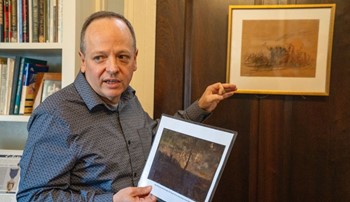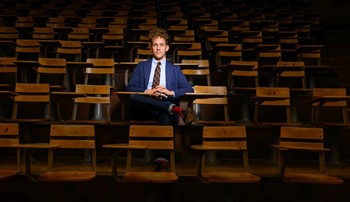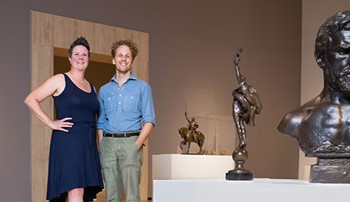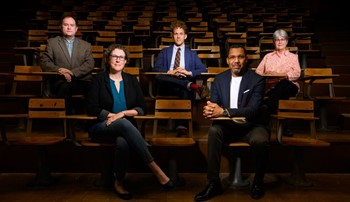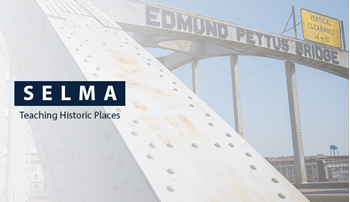Elijah Gaddis
Hollifield Associate Professor of Southern History
Associate Professor
Co-director, Public History Program
History
Office Hours
Tuesday, Thursday, 11-12:30 pm and by appointment
In the news
Education
PhD, University of North Carolina at Chapel Hill
MA, University of North Carolina at Chapel Hill
About Me
Elijah Gaddis is from Cabarrus County, North Carolina, the home of George Clinton and Dale Earnhardt. Currently he is the Hollifield Associate Professor of Southern History and co-director of the Community Histories Workshop at Auburn University, where he is also affiliate faculty in African American and Africana Studies. His work focuses on the spatial, material and cultural histories of the 19th- and 20th-century South. Gaddis’ first book, Gruesome Looking Objects: A New History of Lynching and Everyday Things, was published by Cambridge University Press in 2022. This work looks at the souvenirs, mementos, and relics collected and created to preserve the memory of lynchings over the course of a century. Rooted in interdisciplinary methods - material culture, ethnography, spatial and landscape studies - the book examines the lingering attachments to objects of racial violence and collective accountability for the afterlives of these fraught objects.
At present, Dr. Gaddis is working on a few big projects. For the last several years, he has been thinking about and working toward public history as a reparative practice. This involves slow, close work in and with communities. Dr. Gaddis is also writing two books. The first, with Peter Datcher, is a history of the Baker-Datcher family in Creswell, Alabama, one of the longest-tenured Black landowning families in the South. This oral history based project will recount the lives of a Black, rural family from the antebellum era to present. Dr. Gaddis’ other book builds on his longstanding interest in the spatial and material histories of the Jim Crow era. “The Absolutely True Story of the ‘World’s Largest Negro Dance,’” offers an accounting of tobacco warehouses and jazz bands, migration and Black belonging in early 20th century North Carolina.
As a public and digital historian Gaddis has curated a variety of exhibits, built online archives and projects, and run oral history initiatives. Much of his recent public history work has been through the Community Histories Workshop (CHW) which he co-founded.The CHW is a joint initiative of the University of North Carolina at Chapel Hill and Auburn University, and works in collaboration with organizations and individuals to research, gather, interpret, and preserve untold histories. Gaddis is currently collaborating with a range of community partners including the Wallace Center for Arts and Reconciliation, the Boykin Community Center, the Garden District Preservation Association, Landmarks Foundation of Montgomery, Selma University, and the Town of Prattville. His work with colleagues and collaborators has been funded by the National Endowment for the Humanities, National Park Service, and a range of other organizations.
In his public history work, and in his teaching, Gaddis focuses on community engagement and collaboration. At Auburn, he teaches courses on landscape and spatial history, material culture, museum studies, and digital humanities.
Dr. Gaddis is currently accepting applications from PhD students.
Research Interests
public history, cultural history, material culture, American studies, Southern studies
Publications
- “Interdisciplinary Alchemy: Transforming the Scholarship of Teaching and Learning Through Oral Histories, Place-Based Learning, and Communities of Practice” with Keith Hébert and Leslie Cordie, Transformative Dialogues: Teaching and Learning Journal 18.1 (2025): 84-93.
- “Black Culture, Migration, and North American Metropolitanism,”in Urban Futures, Cultural Pasts: The Heritage of People and Place AMPS in Association with Escola Tècnica Superior d'Arquitectura del Vallès, (Spring 2025): 136-142.
- “Lifecycles of the Loray: Adaptive Reuse and Historic Value” Southern Cultures, 30.4 (Winter 2024): 76-89.
- Gruesome Looking Objects: A New History of Lynching and Everyday Things, Studies on the American South Series, Cambridge University Press, 2022.
- “Place and Materiality,” in Lu Ann De Cunzo and Catharine Dann Roeber (eds.) The Cambridge Handbook of Material Culture Studies (Cambridge University Press, 2022), 471-492.
- “History, Memory, and Community in the Redeveloped Mill,”in Robert Forrant and Mary Anne Trasciati (eds.) Where Are the Workers? Labor’s Stories at Museums and Historic Sites (University of Illinois, 2022), 98-112.
- “Processional Culture and Black Mobility in Maggie Washington’s Wilmington,” Journal of Festive Studies 3.1 (2021): 72-91.
- “Work, Play, and Performance in the Tobacco Warehouse,” Material Culture Review, 90-91(Fall 2019-Spring 2020), 10-23.
- “The Life and Legacy of Ned Cobb,” Alabama Review, 73.4 (October 2020), 295-316







